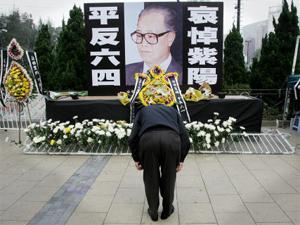The death of Zhao Ziyang, the former General Secretary of the Chinese Communist Party on January 17 has brought tightened security and a heightened sense of looming political unrest in China.
China-watchers are focused on how the CCP will treat Zhao’s death after subjecting him to 15 years of house arrest for his position on the pro-democracy movement of the 1980s. Of equal interest is what the response will be from those who wish to restore his name and redress the injustices committed in the June 4th Tiananmen Square Massacre.
Not only is the CCP facing a crisis of confidence for the injustices committed against Zhao and the pro-democracy movement, it is also facing repercussions from the recent broad exposure of its history of crimes against the Chinese people.
The Epoch Times published a series of nine editorials from Nov. 19 to Dec. 4 called the “Nine Commentaries on CCP,” which exposed the CCP’s pattern of crimes, deceit and violence throughout its history. The commentaries prompted a wave of resignations from the CCP.
The CCP has ordered that party members not read the commentaries, but its actions have merely served to arouse the public’s interest.
As a result of the facts revealed in the commentaries, CCP members in China and abroad have begun resigning from the party, and many have even managed to break through the government’s tight Internet blockade to publish their resignations on an Epoch Times ‘ Web site established for that purpose. The web site has received more than 4,000 announcements of CCP resignations since its establishment on Dec. 3. The number resignations is running between 100 to 200 people every day.
In mid-December, the Politics and Law Committee of the CCP issued a statement nationwide calling on the justice system to immediately discharge anyone who has resigned from the CCP.
According to reliable sources among high-level CCP members, recently the Ministry of State Security has started to question dissidents and relatives of overseas dissidents to find out the source of the “Nine Commentaries on the CCP.”
The commentaries have been translated into 11 languages including English, French and Spanish and has been published abroad. The articles have enabled the world to understand the nature of the CCP through its oppressive policies, stated aims and actions, from its inception to the present. On Dec. 21, the first English forum on the commentaries was held at the National Press Club in Washington, D.C.
One of the speakers was Michael A. Ledeen, Freedom Scholar at the American Enterprise Institute and former adviser to the U.S. National Security Council, State Department and Department of Defense. Mr. Ledeen predicted that the CCP’s dictatorship would crumble, as “Tyranny is the most unstable form of government.”
“One of my favorite yardsticks of nervous dictatorships is the extent at which the ruling class is buying up real estate overseas in areas where you can reasonably expect them to want to go and live,” Mr. Ledeen said. In fact, a large number of CCP officials are purchasing homes in the United States. This kind of preparation for escape has happened many times in other countries before a dictatorship crumbles.
On Jan. 8, more than 40 grass-roots organizations held rallies in Washington to “Say Goodbye to the CCP.” They appealed to Chinese worldwide to completely break from the party. Speakers said that the communist movement has already been abandoned worldwide and that the surviving communist regimes are at great risk of collapse. They advised CCP leaders to wake up, abandon the party and establish a new party. They called for a new China without the CCP.





